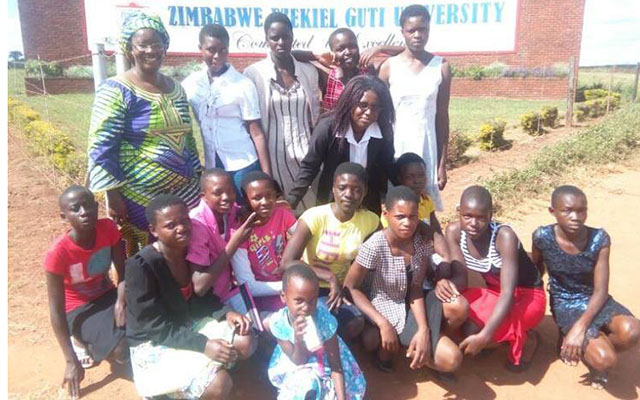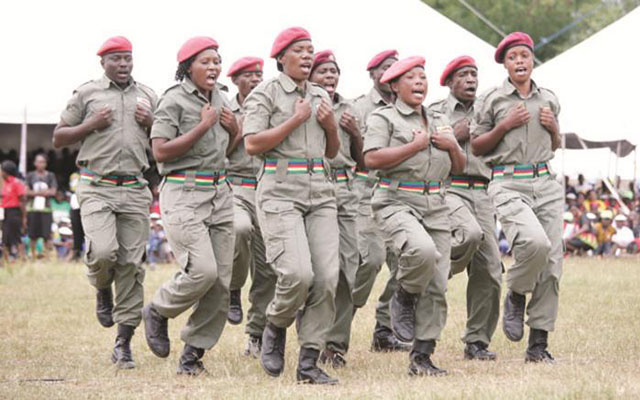Child marriages remain a social scourge


AU ambassador for ending child marriages, Ms Nyaradzayi Gumbonzvanda and Tendai Magwaza (in white blouse) pose with some of the girls from the Rozaria Memorial Trust after the public lecture on child marriages in Bindura recently
Ruth Butaumocho Gender Editor
Tendai Magwaza is an astute bright young teenage girl, who wants to become a journalist once she finishes school.
She has lived all her life in Madziva, in Zimbabwe’s Mashonaland Central Province, but she yearns for a life in a big city, where she hopes to ply her trade, once she graduates from university.
However, her prayer is not to get married early, like her childhood friend and neighbour, Maidei, who at 16 is now a wife and a mother to two boys.
Sitting quietly in a corner at the Zimbabwe Ezekiel Guti University auditorium, during a public lecture on child marriages recently, Tendai beamed with pleasure, as she counted herself lucky for not being a statistic on the subject under discussion.
As she tried to concentrate on the ongoing debate, she could not help but gloss over and marvel at the eloquence of each speaker who took to the podium to engage on the discourse. “If only I can survive the scourge of child marriage, I will definitely be standing on the very same podium, wearing the same heels, a few years from now,” she whispered to her friend, Ruth, who was engrossed in the debate.
Tendai might be lucky, but not for hundreds of other girls of her age, or even younger who are being married off young, in most parts of Zimbabwe, particularly in Mashonaland Central, where the practice is rife.
While there could be various reasons for the high prevalence of the problem in the region, poverty has been singled out as the major cause that has decimated the population of young girls in the province.
“Most of my friends, who got married, did so soon after Grade 7 after their parents failed to raise fees for them so that they could proceed to secondary school,” suggested Tendai.
However African Goodwill Ambassador for ending child marriages, Ms Nyaradzayi Gumbonzvanda said while poverty could be a contributor in this social ill, the problem was a result of sexual exploitation of hapless girls by irresponsible men.
Speaking during the ZEGU public lecture on child marriages organised by the university and a non-governmental organisation, Real Open Opportunities for Transformation Support, Roots, in Bindura last week, Ms Gumbonzvanda said it was important to demystify the myth and the linear argument that young girls were marrying early as an option out of poverty.
“Girls are sexually exploited, and it is not a poverty issue, but it is the criminal and exploitation of these hapless girls by people in position of power.
“By justifying that child marriages are as a result of poverty, we are justifying what is not true. If a family gets money for lobola and marrying her off to an older or richer guy, will that end poverty?”
Ms Gumbonzvanda said it was important for society to draw a line between a social vice and serious violation of human rights which were also criminal. “Sexual reproductive health related issues of young girls are matter of concern. When a young girl is married off, there is violation of multiple rights such that child marriages should not be defined as such, but should be deemed as criminal,” she said.
She added that it was folly and mischievous to use tradition, religion and culture in justifying child marriages, when society should be discouraging the practice. “We have heard and listened to all the reasons given for the upsurge in child marriages, but communities should unite and bring perpetrators of this heinous act, to book.
Contributing to the debate, Roots executive director, Ms Beatrice Savadye said while poverty was touted as the biggest vice in child marriages, several subtle, but influential trends were also contributing to the problem, with pop culture being one of them. “Pop culture is slowly emerging as one of the contributors to child marriages. A lot of teenagers are now taking part in activities like pasa pasa, street sex and all night parties, without taking time to think about the consequences of early sexual debut.
She added that cultural practices such as chinamwari were also fuelling the problem of early child marriages, because girls ended up engaging in sexual exploits to practice what they were taught. “Of coursing poverty is also contributing, but there are other trends that are also worsening the problem and that would need to be looked at holistically,” she said.
Ms Savadye called on adequate research to explore more on the subject to ensure that the results would be used to find lasting solutions to the problem. “Further research is needed on the subject so that policymakers and other stakeholders can offer prudent solutions to the problem, which has become a source of consternation across.
“Our girls deserve a better future. That future will only be possible, once we are able to identify where the problem is emanating from,” she said.
According to the Zimbabwe Multiple Indicator Cluster Survey (2014), Mashonaland Central tops the list of provinces with the highest number of cases of child marriages with 50 percent of the marriages involving minors.
The province is followed by Mashonaland West with 42 percent; Masvingo 39 percent; Mashonaland East 36 percent; Midlands 31 percent; Manicaland 30 percent; Matabeleland North 27 percent; Harare 19 percent and Matabeleland South 18 percent.
A number of reasons have been given for the high prevalence of child marriages in Mashonaland Central, with the economic profile of some of the districts cited as the major contributory factor to the problem.
In the case of Shamva district, it has a high number of resettlement areas such that school going children have to travel long distances to school, forcing several kids, particularly girls to drop out of school.
The same district is home to a lot of mining concerns-both formal and informal- whose economic activities have resulted in a lot of children dropping out of school to go and work.
Historical narratives also suggest that for long education was not considered as a priority in Shamva and its environs, with many school going children opting to work in mines and farms rather than go to school.
In Mbire district, which has got the highest prevalence of child marriages in the province, a lot of girls reportedly drop out of school in primary school and eventually opt for marriage, “to kill boredom”.
While there are ongoing researches to establish the core cause of child marriages, the figures continue to go up unabated. Zimbabwe is among the 41 countries in the world with many cases involving minors being forced into marriages by their parents or guardians.
Issues that emerged during the discussion leading to early child marriages include abuse of orphans by their guardians, poverty, school drop-outs, abuse of technology and cultural influences.
- Feedback:[email protected]










Comments